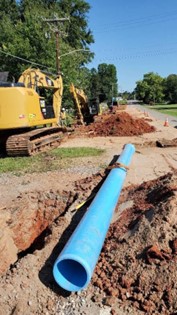The Thrasher Group North Carolina Completes City Water System Replacement Project Under Budget, Funding Forward-Thinking 5-Year Water Infrastructure Plan
Project Overview:
High Shoals, NC Water System Replacement (Phase 1)
The City of High Shoals’ public water supply infrastructure included thousands of feet of water line at or nearing end of life. The water system was experiencing frequent breaks and losing water each day. To prevent increased maintenance costs and potential interruptions to service, the city needed a plan to replace the water line.
The City of High Shoals hired The Thrasher Group North Carolina to design and replace the water system. The project was funded by a Community Development Block Grant (CDBG) grant from the North Carolina Department of Commerce.

Project Goals
- Replace the largest water line segment in the City (5,980 linear feet)
- Replace faulty meters, 73 meters hooked directly into the line
- Reduce water loss (thousands of gallons per day)
- Ensure cutover to new water line with minimal disruption to water service
- Work with local grant writer to secure Community Development Block Grant
- Meet all applicable North Carolina state regulations
Civil Engineering & Surveying Services Provided
- Design Surveys
- Design
- Plans & Specifications
- Permitting Coordination
- Contract Documents
- Bidding Services
- Construction Administration
- Right-of-Way/Easement Acquisition Surveying & Mapping
- Final Project Certification
Project Approach
The Thrasher Group North Carolina took a phased approach to the water line replacement needed in High Shoals. This case study focuses on the first Phase of the project, which involved replacing the largest water line segment in the city (over 3,000 feet of 12 inch water line, around 1,000 feet of 8 inch water line and 1,500 feet of 6 inch water line).
The second phase of the project will involve replacing the remaining water lines in town and The City of High Shoals, NC, is currently in the application process for another grant for Phase 2 of the project.
Project Challenges
One of the main challenges of the project was that the new water system replacement needed to be installed without disrupting water services to the residents. The Thrasher Group would need to work closely with the City of High Shoals to develop a phased plan that would minimize downtime to the community’s water services.
Another challenge of the project was that each phase or section of the new water line had to be disinfected and pressure tested before residences could be connected. This process took several weeks to complete and required Engineer inspections and NC State approval.
Project Outcomes
The project was a success, completed on time and under budget.
- Minimal Downtime – Leveraging jumpers installed at key locations through the project, The Thrasher Group North Carolina successfully replaced the main feeder lines while keeping water service active, with minimal disruption to services for local residents and institutions.
- Completed On Time – The Thrasher Group successfully managed the water system replacement construction timeline and key milestones like Engineer inspections and NC State approval. The project was completed on time.
- Completed Under Budget – Because the project was completed under budget, the Division of Water Infrastructure (DWI) permitted the City of High Shoals to use some of the remaining grant funds to pay for updating the City’s Asset Management Plan. Thrasher was able to update the Asset Management Plan and Capital Improvement Plan that they had originally prepared for the City. This updated inventory of all water and sewer assets by condition and age will position High Shoals to proactively build out its water infrastructure, preventing future water loss and service disruptions.
Client Quote
“The Thrasher Group North Carolina did an excellent job on this project. They were very professional and worked closely with us to minimize interruption to water service for our community during the replacement.”
– P.J. Rathbone, High Shoals, NC, Mayor
